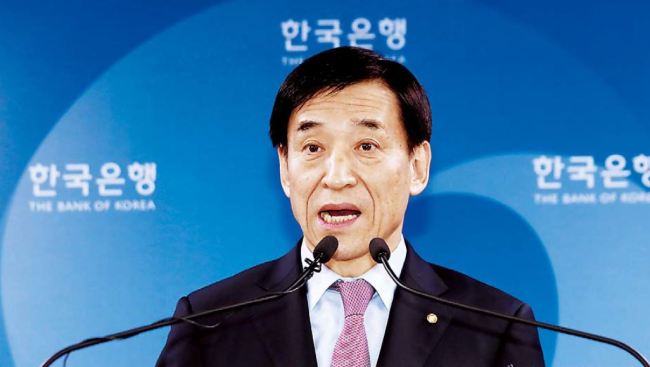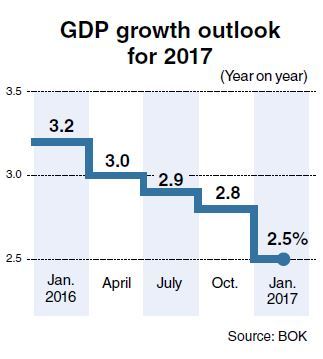BOK cuts 2017 growth outlook to 2.5%, holds key rate
By Korea HeraldPublished : Jan. 13, 2017 - 17:23
South Korea’s central bank Friday lowered its 2017 growth outlook to 2.5 percent, citing a greater risk in already weak domestic consumption.

Despite bigger downside risks, the Bank of Korea kept its base rate unchanged at a record low of 1.25 percent in an apparent move to strike a balance between supporting growth and seeking stability in the financial market. It was the seventh consecutive rate freeze since it lowered the rate by 0.25 percentage point in June last year.
The BOK said in an economic outlook report that it revised down the growth forecast to 2.5 percent from the October prediction of 2.8 percent for 2017, as domestic demand will turn weaker than previously expected, although exports should do better than last year.

The bank’s projection is slightly gloomier than the Finance Ministry’s growth target of 2.6 percent for this year but rosier than most think tanks’ 2.1-2.4 percent forecasts.
Korea’s economic growth rate has been in the 2 percent range since 2012, except for the 3.3 percent expansion in 2014. Finance Minister Yoo Il-ho recently said the economy seems to have achieved growth of 2.7 percent in 2016.
The BOK also cut its consumer inflation projection for this year by 0.1 percentage point to 1.8 percent. In 2018, it will inch up to 1.9 percent.
BOK Gov. Lee Ju-yeol said the decrease in private consumption was the greatest factor that affected the cut in the latest growth outlook.
“On the demand side, we made the largest adjustment in private consumption,” Lee said at a press conference.
“Weak consumption is mainly affected by increased political uncertainties and corporate restructuring. I still believe the recovery of consumer sentiment is the most significant task in economic policies.”
The rate decision by the BOK’s seven members of its monetary policy committee was unanimous, Lee said.
He also made it clear the BOK will not simply follow the steps of the US Federal Reserve’s rate hikes. The Fed in December signaled it would increase rates three times this year, driving up the dollar and market interest rates. A wider gap between the interest rates of the BOK and the Fed could spark a foreign capital exodus.
“We should thoroughly assess how changes in the US interest rate would impact our economy and financial stability,” Lee said.
Asked whether Korea’s $370 billion foreign exchange reserves is enough, he said “it is not in shortage.”
The high level of household debt, which is estimated to have exceeded 1,300 trillion won late last year, was mainly affected by the government’s expansionary policy and deregulation in the real estate sector, Lee said.
The boom in the construction industry in recent years is expected to slow this year, but there will not be any drastic fall in home prices, he added.
By Kim Yoon-mi (yoonmi@heraldcorp.com)
-
Articles by Korea Herald


















![[KH Explains] Hyundai's full hybrid edge to pay off amid slow transition to pure EVs](http://res.heraldm.com/phpwas/restmb_idxmake.php?idx=652&simg=/content/image/2024/04/18/20240418050645_0.jpg&u=20240419100350)

![[Today’s K-pop] Zico drops snippet of collaboration with Jennie](http://res.heraldm.com/phpwas/restmb_idxmake.php?idx=642&simg=/content/image/2024/04/18/20240418050702_0.jpg&u=)